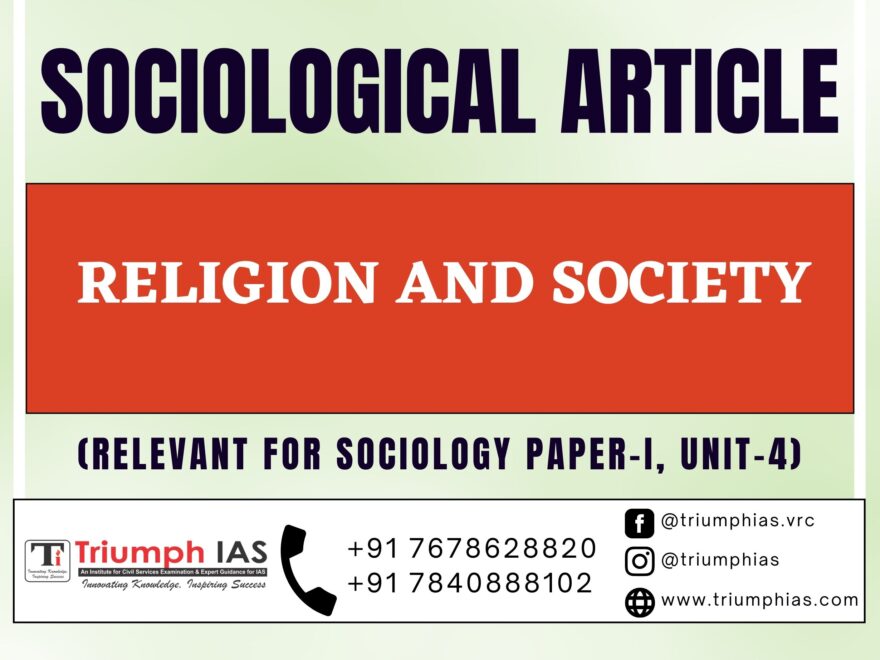Religion and society
(Relevant -GS PAPER-2)

Religious beliefs have been present in all human societies since their inception. Archaeological excavations have uncovered evidence of ancient religious practices, such as ceremonial burial sites and ritual objects. Religious disagreements have resulted in significant social conflicts and even warfare.
Sociologists describe sociology as the study of religion as a comprehensive set of beliefs and practices related to sacred things that are considered separate and restricted. These beliefs and practices bring together a moral community, known as a church, of individuals who share the same convictions.
Durkheim, Weber, and Marx, three of the pioneering sociological thinkers, have lasting impacts on the study of religion within sociology.
Functionalist perspective
- Emile Durkheim, who established the functionalist approach, devoted a significant portion of his academic career to examining various religions, particularly those practiced in small societies. His research centered on the totemism, or the basic kinship system, of the Australian aborigines, which he viewed as a fundamental form of religion. The findings from this study served as the foundation for Durkheim’s well-known 1921 book, The Elementary Forms of the Religious Life, considered a seminal work in the sociology of religion.
- Durkheim discovered that individuals tend to distinguish between religious symbols, objects, and rituals that are considered sacred and everyday symbols, objects, and routines known as profane. Sacred objects are frequently associated with divine properties that set them apart from profane objects.
- In addition, Durkheim posited that religion is not limited to faith alone, but also encompasses customary rituals and ceremonies performed by a group of adherents. This collective engagement in religious practices serves to develop and reinforce a shared sense of group solidarity.
Weber perspective
- Durkheim asserted that his theory was relevant to all types of religions, although his research was based on a limited number of examples. On the other hand, Max Weber conducted an extensive analysis of religions worldwide, focusing on the major global religions with millions of followers.
Marx: Conflict theory
- Karl Marx had a unique viewpoint on religion that differed from both functionalism and Weberian perspective. Unlike Durkheim and Weber, Marx did not practice any religion and did not undertake an in-depth investigation into religion.
Marx’s ideas on the sociology of religion were influenced by the philosophical and theological works of the 19th century, particularly Ludwig Feuerbach’s The Essence of Christianity (1841). Feuerbach posited that people are not fully aware of the social constructs they live in, and as a result, they project their culturally informed norms and values onto separate entities such as gods, spirits, angels, and demons.
Analysis from different perspective, religion has been an important part in the life
Follow us :
-
https://www.instagram.com/triumphias
https://www.youtube.com/c/TriumphIAS
https://t.me/VikashRanjanSociology
Find More Blogs
Scope of the subject and comparison with other social sciences
Changing family structure in India Modernity and social changes in Europe
sociology, religion, beliefs, practices, Durkheim, Weber, Marx, functionalist perspective, conflict theory, sacred, profane, solidarity, global religions, social constructs, human societies.#Sociologyforupsc #sociologyforupscinhindi #sociologyforupscgs1 #sociologyforupscprelims #sociologyforupscinenglish #sociologyforupscmainsinhindi #sociologyforupscoptionalinhindi #sociologyforupscmains #sociologyforupscplaylist #sociologyforupsclecture1 #sociologyforupsccse #sociologyforupscoptional #syllabusofsociologyforupscoptional #bestbookforsociologyforupsc #sociologyoptionalforupscanswerwriting #sociologyoptionalforupscanukumari #sociologyoptionalforupscabhijeet #sociologyoptionalforupscanalysis #sociologyoptionalforupscalllectures #sociologysyllabusforupscanalysis

